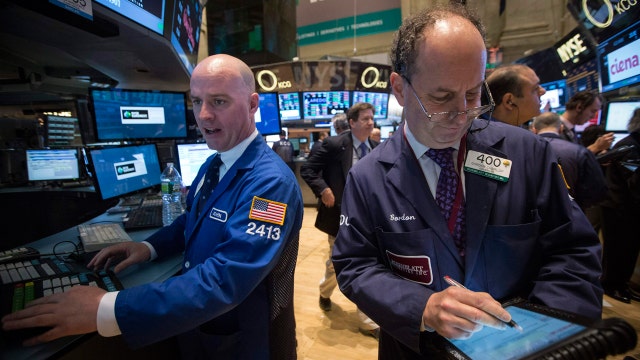Volatility Without Conviction: What You Missed on Wall Street This Week
With the odds of a September rate hike put to bed, investors on Wall Street searched for a catalyst this week to drive momentum.
Without one, it was a week of heightened volatility.
Here are the biggest market drivers you might have missed.
The Tweet that Launched a Biotech Selloff
On Monday, Democratic presidential candidate and former Secretary of State, Hillary Clinton, quote tweeted a New York Times piece on the high cost of medication.
The Times profiled several drugs used to help treat “orphan diseases,” or those that affect a very small portion of the population. The tweet from Clinton was enough to send the Nasdaq biotech index plunging more than 4% when she promised to outline how she would help make the drugs available and more affordable to those who need them, should she be elected president.
Clinton followed through on her promise, releasing a plan that would allow Medicare to negotiate lower drug costs and cap out-of-pocket expenses for patients with chronic illnesses. Among other provisions, her plan would also allow Americans to import drugs from abroad, and encourage more generic-drug production while lowering the amount of time pharmaceutical companies retain exclusivity for various drug patents.
Biotechs recovered some of their lost ground during the week, but came under renewed pressure on Friday to close down more than 13%.
Yellen Steps Up to the Podium
On Thursday, just one week after the Federal Open Market Committee opted to keep short-term interest rates at historic lows in a near-zero range, Fed Chief Janet Yellen took to the podium to talk about inflation.
During her remarks at the University of Massachusetts, Amherst, Yellen sought to clarify the central bank’s intentions. She said she, along with “most other” policymakers at the Fed, “anticipate” raising rates sometime before the end of the year.
She added that the FOMC anticipates inflation will return to 2% over the next few years as “temporary factors currently weighing on inflation wane.”
Those temporary factors include a range of global economic challenges like the slowdown of the Chinese economy, which has so far resulted in twice devaluing its yuan currency. The Fed chief said she does not see those effects weighing on the U.S. economy in such a way that it will have a “significant effect on the path for policy.”
Yellen, who had trouble finishing the last parts of her speech, abruptly ended her talk and was seen by medical professionals who determined she was dehydrated.
GDP Data Surprise to the Upside
Final data from the Commerce Department released Friday morning showed the U.S. economy grew at a quicker pace than originally estimated.
Second-quarter GDP rose at an annualized rate of 3.9%, up from a 3.7% pace reported in August. The increase was driven, in large part, by strong consumer spending and exports.
The reading was a welcome sign for investors who were hoping to see strong growth in the last part of the first half of the year after a very weak first quarter that was initially thought to have grown at a negative pace. It could also be good news for the Federal Reserve, which has repeatedly said that it will remain dependent on economic data before hiking rates.
VW CEO Out Amid Emissions Scandal
It was a wild ride for German automaker Volkswagen. In one week, an emissions scandal forced out its CEO, while ushering in a brand new name to lead the company.
Volkswagen announced Friday afternoon Porsche chief executive Matthias Mueller, who served as the head of the sports car unit since 2010, will take the reins effective immediately. The appointment came a day after Martin Winterkorn, who had led the company since 2007, said he was stepping down from his post after both he and the company came under intense focus and scrutiny following a discovery that nearly half of the car company’s diesel cars in America skirted clean-air regulations.
In a statement, Winterkorn said he accepted responsibility for the “irregularities,” but said he was “not aware of any wrongdoing on my part.”
Next Week: All About September Payrolls
A slew of key economic reports are on tap for next week – including the all-important September jobs report.
Wall Street will be watching for a strong non-farm payrolls report with a gain of about 200,000 jobs.
“As Yellen emphasized last week, the FOMC expects further improvement in the labor market, so at the margin, a relatively healthy jobs report would raise the probability of Fed liftoff this year,” economists at Deutsche Bank wrote in a note on Friday. “It will be interesting to see what Vice Chair Fischer has to say about the latest data when he addresses the Boston Fed conference on monetary policy Friday afternoon.”
Below is a list of key reports due ahead of the bell next week.
- Monday: Personal income and spending; pending home sales
- Tuesday: S&P/Case-Shiller home price index
- Wednesday: ADP employment; Chicago PMI
- Thursday: Weekly jobless claims, ISM manufacturing
- Friday: Non-farm payrolls report; factory orders




















